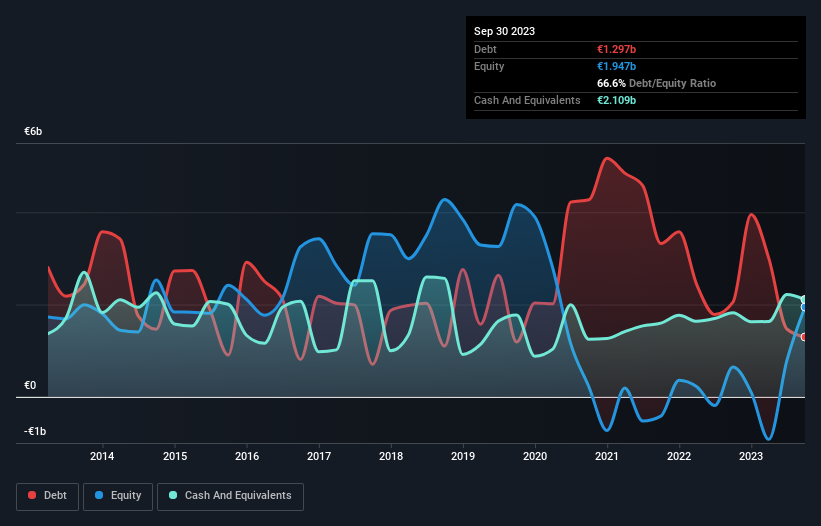
Howard Marks put it nicely when he said that, rather than worrying about share price volatility, 'The possibility of permanent loss is the risk I worry about... and every practical investor I know worries about.' When we think about how risky a company is, we always like to look at its use of debt, since debt overload can lead to ruin. Importantly, TUI AG (ETR:TUI1) does carry debt. But the real question is whether this debt is making the company risky.
Why Does Debt Bring Risk?
Debt assists a business until the business has trouble paying it off, either with new capital or with free cash flow. If things get really bad, the lenders can take control of the business. However, a more frequent (but still costly) occurrence is where a company must issue shares at bargain-basement prices, permanently diluting shareholders, just to shore up its balance sheet. By replacing dilution, though, debt can be an extremely good tool for businesses that need capital to invest in growth at high rates of return. The first step when considering a company's debt levels is to consider its cash and debt together.
Check out our latest analysis for TUI
What Is TUI's Net Debt?
The image below, which you can click on for greater detail, shows that TUI had debt of €1.30b at the end of September 2023, a reduction from €2.05b over a year. However, its balance sheet shows it holds €2.11b in cash, so it actually has €811.9m net cash.

A Look At TUI's Liabilities
According to the last reported balance sheet, TUI had liabilities of €8.88b due within 12 months, and liabilities of €5.33b due beyond 12 months. Offsetting this, it had €2.11b in cash and €759.1m in receivables that were due within 12 months. So its liabilities total €11.3b more than the combination of its cash and short-term receivables.
This deficit casts a shadow over the €3.47b company, like a colossus towering over mere mortals. So we definitely think shareholders need to watch this one closely. At the end of the day, TUI would probably need a major re-capitalization if its creditors were to demand repayment. Given that TUI has more cash than debt, we're pretty confident it can handle its debt, despite the fact that it has a lot of liabilities in total.
Pleasingly, TUI is growing its EBIT faster than former Australian PM Bob Hawke downs a yard glass, boasting a 204% gain in the last twelve months. There's no doubt that we learn most about debt from the balance sheet. But ultimately the future profitability of the business will decide if TUI can strengthen its balance sheet over time. So if you want to see what the professionals think, you might find this free report on analyst profit forecasts to be interesting.
Finally, while the tax-man may adore accounting profits, lenders only accept cold hard cash. While TUI has net cash on its balance sheet, it's still worth taking a look at its ability to convert earnings before interest and tax (EBIT) to free cash flow, to help us understand how quickly it is building (or eroding) that cash balance. Over the last two years, TUI actually produced more free cash flow than EBIT. That sort of strong cash generation warms our hearts like a puppy in a bumblebee suit.
Summing Up
While TUI does have more liabilities than liquid assets, it also has net cash of €811.9m. The cherry on top was that in converted 311% of that EBIT to free cash flow, bringing in €971m. So we don't have any problem with TUI's use of debt. When analysing debt levels, the balance sheet is the obvious place to start. However, not all investment risk resides within the balance sheet - far from it. Case in point: We've spotted 2 warning signs for TUI you should be aware of, and 1 of them is significant.
When all is said and done, sometimes its easier to focus on companies that don't even need debt. Readers can access a list of growth stocks with zero net debt 100% free, right now.
Valuation is complex, but we're here to simplify it.
Discover if TUI might be undervalued or overvalued with our detailed analysis, featuring fair value estimates, potential risks, dividends, insider trades, and its financial condition.
Access Free AnalysisHave feedback on this article? Concerned about the content? Get in touch with us directly. Alternatively, email editorial-team (at) simplywallst.com.
This article by Simply Wall St is general in nature. We provide commentary based on historical data and analyst forecasts only using an unbiased methodology and our articles are not intended to be financial advice. It does not constitute a recommendation to buy or sell any stock, and does not take account of your objectives, or your financial situation. We aim to bring you long-term focused analysis driven by fundamental data. Note that our analysis may not factor in the latest price-sensitive company announcements or qualitative material. Simply Wall St has no position in any stocks mentioned.
About XTRA:TUI1
Undervalued with limited growth.
Similar Companies
Market Insights
Community Narratives


